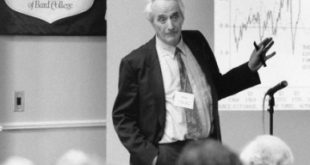The Bourbaki-Debreu delusion of axiomatic economics By the time that we have arrived at the peak first climbed by Arrow and Debreu, the central question boils down to something rather simple. We can phrase the question in the context of an exchange economy, but producers can be, and are, incorporated in the model. There is a rather arid economic environment referred to as a purely competitive market in which individuals receive signals as to the prices of...
Read More »Reepalus utredning om vinster i välfärden
Reepalus utredning om vinster i välfärden I november presenteras utredningen om vinster i välfärden som Ilmar Reepalu (S) är ordförande för. Men redan nu har nyhetsmedier tagit del av förslag från utredningen om hur en vinstbegräsning skulle kunna se ut. SVT rapporterade i förra veckan att Joachim Landström, doktor i företagsekonomi vid Uppsala universitet, har tagit fram ett förslag till utredningen. Lite förenklat innebär den en begränsning på vinster på...
Read More »Introduction to Price Supports
It’s back to school time, so I’ve been pondering what might be helpful for students. In particular, I’ve becomine sort of obsessed withthe distinctions among “price floors,” “quantity ceilings,” and “price supports,” especially since we’ve seen a few (misguided?) examples of each as of late. So here is what you need to know about price supports in order to ponder their potential reasonableness.
Read More »Hicks’ misrepresentation of Keynes — the Wicksellian connection
Hicks’ misrepresentation of Keynes — the Wicksellian connection Having read my post on Krugman and Hicks’ IS-LM misrepresentation of Keynes’ theory, professor Jan Kregel kindly sent an unpublished article he wrote back in 1984 — The Importance of Choosing a Model: Hicks vs. Keynes on Money, Interest and Prices — in which it is argued that Hicks’ particular presentation of Keynes’ theory and choice of model was “crucial to its destruction”: Hicks’ choice of...
Read More »The euro disaster — Wynne Godley was spot on already back in 1992!
The euro disaster — Wynne Godley was spot on already back in 1992! If there were an economic and monetary union, in which the power to act independently had actually been abolished, ‘co-ordinated’ reflation of the kind which is so urgently needed now could only be undertaken by a federal European government. Without such an institution, EMU would prevent effective action by individual countries and put nothing in its place. Another important role which any...
Read More »No man is an island!
No man is an island! Given how sweeping the changes wrought by SMD (Sonnenschein-Mantel-Debreu) theory seem to be, it is understandable that some very broad statements about the character of general equilibrium theory were made. Fifteen years after General Competitive Analysis, Arrow (1986) stated that the hypothesis of rationality had few implications at the aggregate level. Kirman (1989) held that general equilibrium theory could not generate falsifiable...
Read More »Sacrificing content for the sake of mathematical tractability
Sacrificing content for the sake of mathematical tractability A commodity is a primitive concept (Debreu 1991), and the model comprises a finite set of classes of commodities. The number of distinguishable commodities (Debreu 1959) or commodity labels (Koopmans and Bausch 1959) is a natural number. The Arrow—Debreu model continues by defining these commodities as goods that are physically determined … But after asserting that commodities are physically...
Read More »General equilibrium — the art of denying the obvious
General equilibrium — the art of denying the obvious General equilibrium is fundamental to economics on a more normative level as well. A story about Adam Smith, the invisible hand, and the merits of markets pervades introductory textbooks, classroom teaching, and contemporary political discourse. The intellectual foundation of this story rests on general equilibrium, not on the latest mathematical excursions. If the foundation of everyone’s favourite...
Read More »General equilibrium theory — still dead after all these years
General equilibrium theory — still dead after all these years Raphaële Chappe has written a very interesting article about the value of general equilibrium theory, concluding in the following words: For a student of real world markets, general equilibrium theory appears strangely distant. It is not surprising that a highly abstract framework consisting of hyper-rational agents might be ill equipped to provide a sufficiently credible account of markets in...
Read More »Krugman’s models — squeezing out central ideas from Keynes
Krugman’s models — squeezing out central ideas from Keynes The gist is that despite Krugman’s claims to the contrary, the analysis is not really Keynesian, at least in comparison to The General Theory, or GT. It does hark back to the world of the turn of the 20th century Swedish economist Knut Wicksell and contemporaries and followers such as Irving Fisher, James Tobin, and Robert Mundell … Krugman argues that the central bank should somehow intervene to...
Read More » Heterodox
Heterodox









